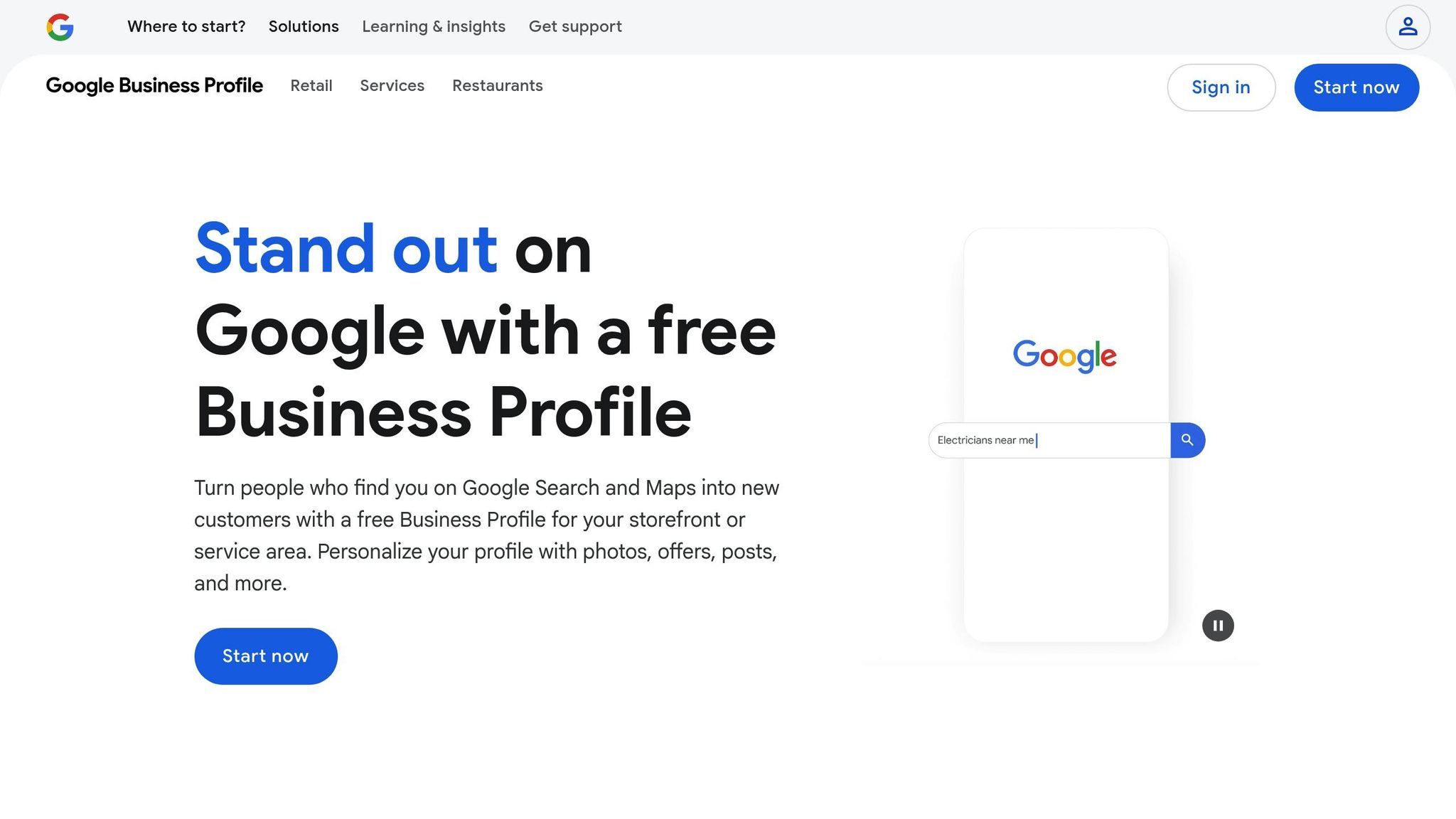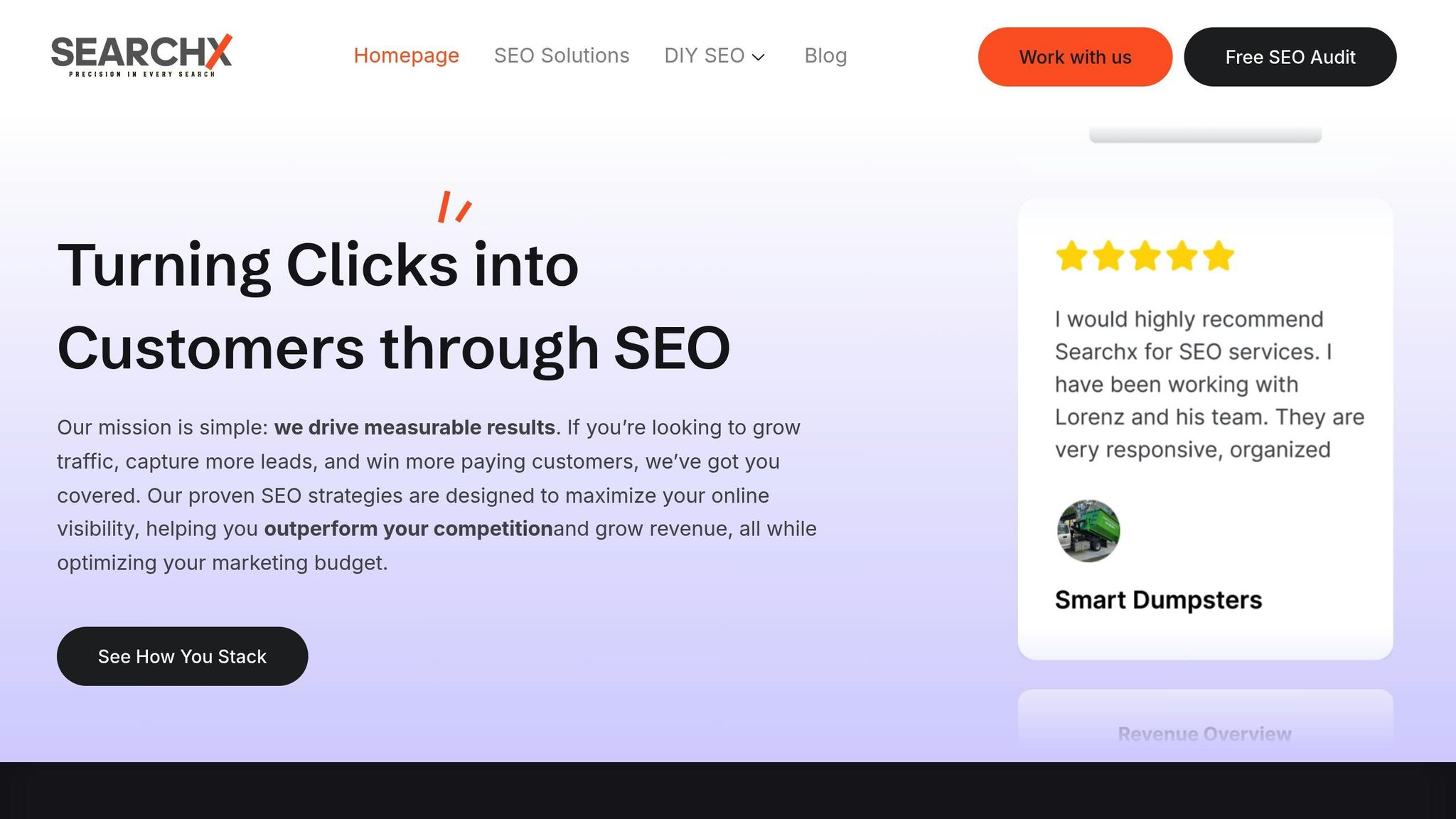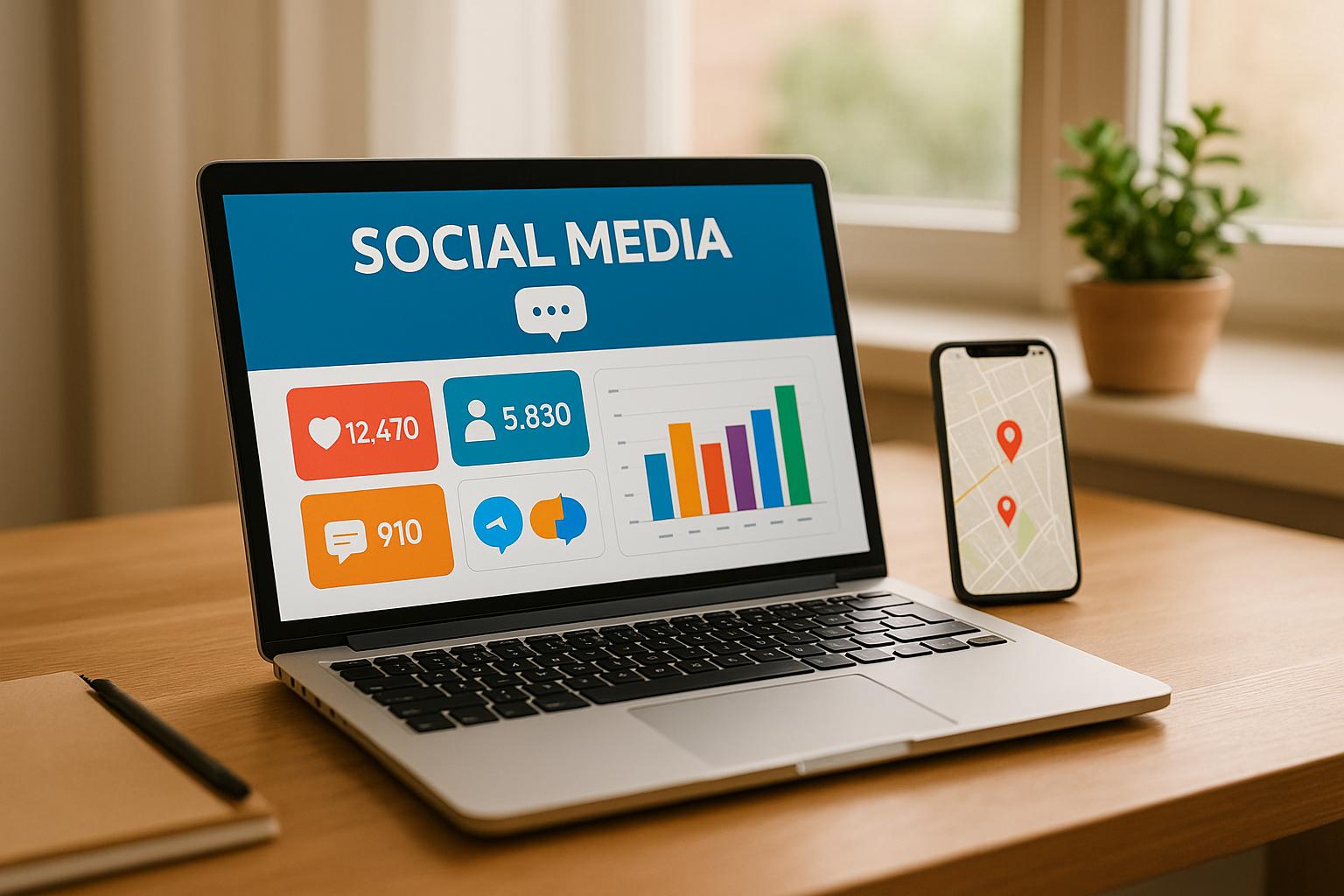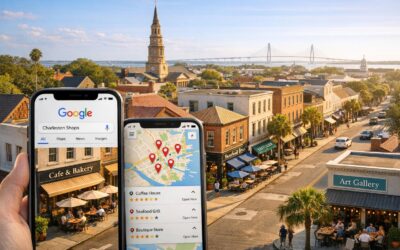Social media signals – likes, comments, shares, and reviews – play an important role in improving local SEO. These interactions show search engines that your business is active, relevant, and trusted by the community. Platforms like Facebook, Instagram, and Google Business Profile are particularly effective for increasing local visibility when optimized correctly.
Key Takeaways:
- Engagement Metrics: Likes, shares, and comments signal relevance to search engines.
- Consistency Matters: Ensure your business’s Name, Address, and Phone Number (NAP) are identical across platforms.
- Local Content: Use geotags, local hashtags, and location-based posts to connect with nearby audiences.
- Customer Reviews: Positive reviews on platforms like Google and Facebook build trust and boost rankings.
- Platform-Specific Tips:
- Facebook: Enable the “Check-In” feature and share community-focused posts.
- Instagram: Use geotags, location stickers, and eye-catching visuals.
- Google Business Profile: Keep your profile updated with posts, photos, and reviews.
Search engines increasingly rely on AI to evaluate social media activity, focusing on quality engagement and local relevance. Businesses that maintain active, optimized profiles and engage consistently with their audience are more likely to rank higher in local searches.
How To Use Social Media For Local SEO
How Social Media Signals Affect Local Search Rankings
Grasping how social media signals impact local search rankings can help businesses refine their strategies. These signals influence rankings through both direct and indirect channels, playing a significant role in enhancing local SEO. Let’s explore how they work and how AI is reshaping the way social signals are analyzed.
Direct Effects of Social Media on Rankings
Social media signals have a direct impact on local search rankings by leveraging engagement metrics and local interactions. When customers in your area like, comment, share, or check in at your business on platforms like Facebook or Instagram, they’re sending strong indicators to search engines about your relevance to the local community.
Additionally, optimized social media profiles can appear in search results, giving your business more visibility. This makes it essential to maintain well-optimized profiles to capture additional search opportunities.
Interestingly, Bing’s algorithm places a greater emphasis on social signals compared to Google. Given that Google and Bing together dominate over 95% of the global search engine market, understanding how both platforms interpret these signals is key to a well-rounded SEO approach.
Local intent searches are a goldmine for businesses. With 46% of Google searches having local intent, and 18% of local mobile searches leading to purchases within 24 hours, the connection between social engagement and immediate business outcomes is undeniable.
Indirect Ways Social Media Helps Local SEO
Beyond direct effects, social media offers a host of indirect benefits that can strengthen your local SEO presence. These include improved authority, higher traffic, and a broader online presence.
For example, when social media drives traffic to your website, it signals to search engines that your content is valuable, which can improve rankings over time. Social referrals also contribute to building backlinks and local citations, both of which are critical for SEO.
Regularly updating your social channels with engaging content can amplify your reach, making it more likely that your business appears in search results. Furthermore, customer reviews and recommendations shared on social platforms generate positive signals that search engines factor into local rankings.
How AI and Algorithms Measure Social Signals
Today’s search engines rely on artificial intelligence and machine learning to evaluate social media signals. These technologies analyze vast amounts of social data to uncover patterns that influence local search rankings.
Using Natural Language Processing (NLP), AI can assess the context and sentiment of social media interactions. It’s not just about counting mentions anymore – AI also evaluates the quality and emotional tone of those mentions.
Real-time analytics further refine local search results by tracking engagement metrics as they happen.
The principles of Expertise, Experience, Authoritativeness, and Trustworthiness (E-E-A-T) play a key role in how AI assesses social signals. Systems prioritize content that is consistent, reliable, and useful. With tools like Google’s AI Overview pulling data from Google Business Profiles – such as reviews, photos, and business hours – social media content has new opportunities to influence search rankings.
As AI continues to evolve, it’s becoming better at understanding conversational search patterns. Social media content that addresses common local questions is increasingly likely to appear in AI-generated search results. This makes it more important than ever to tailor your social content to local audience needs.
Best Social Media Platforms for Local SEO
When it comes to leveraging social media for local SEO, picking the right platforms can make a huge difference. While many platforms provide opportunities for local businesses, Facebook, Instagram, and Google Business Profile are the standout options for improving local search visibility in the United States. Each platform brings its own strengths to the table.
Facebook and Instagram for Local Engagement
With a staggering 3.07 billion monthly users, Facebook is a must for local businesses. It allows you to connect with your community through business pages, local groups, and targeted ads. Video content – especially live videos – tends to spark higher engagement. Plus, Facebook ads can reach up to 1.9 billion people worldwide, making it a powerful tool for connecting with potential customers.
Instagram, with its 2 billion monthly users, takes a more visual approach. Features like geotags and location stickers make it easy for local customers to find businesses nearby. By sharing seasonal reels or eye-catching visuals, businesses can encourage local interaction and build stronger connections.
Google Business Profile for Local SEO

Your Google Business Profile directly influences how your business shows up in local search results. This free tool allows you to manage your presence on Google Search and Maps, making it a key factor in local SEO. Businesses with photos on their profiles see 42% more requests for directions and 35% more clicks to their websites. Even better, using Google Posts can increase profile views by an impressive 416%.
Google ranks local businesses based on relevance, distance, and prominence. Keeping your profile updated with fresh posts, special offers, and events can improve relevance, while customer reviews and ratings help boost prominence. Features like the Q&A section and review management tools also allow businesses to demonstrate active engagement by responding promptly to inquiries.
Other Platforms: LinkedIn and X
Beyond the big three, LinkedIn and X (formerly Twitter) also offer local SEO benefits. LinkedIn is ideal for B2B services and professional networking, engaging nearly 48.5% of its 1 billion users monthly. Meanwhile, X, with 586 million daily users, excels in real-time engagement through trending hashtags and geo-tagging.
For example, one agency doubled its profile visibility in just 90 days by optimizing its LinkedIn presence and sharing technical articles. Similarly, a consulting client generated over 100,000 impressions and inbound leads within 60 days through consistent posts and targeted ads.
Other platforms to consider include TikTok, which boasts 1.5 billion monthly users, and Nextdoor, which connects businesses with nearby communities. Additionally, YouTube, used by 81% of U.S. adults, is an excellent choice for video marketing tailored to local audiences.
| Platform | Monthly Users | Local SEO Features |
|---|---|---|
| 3.07 billion | Business Pages, Groups, Local Ad Targeting | |
| 2 billion | Geotags, Location Stickers, Stories, Reels | |
| TikTok | 1.5 billion | Location-focused Hashtags, Short-form Videos |
| YouTube | 2.5 billion | Local video content, community engagement |
| 1 billion | Professional Networking, B2B targeting | |
| X | 586 million | Real-time Updates, Trending Local Hashtags |
The best platform for your business depends on your target audience, goals, and industry. Regardless of the platform, success requires consistent engagement, authenticity, and a clear strategy. Coming up, we’ll dive into actionable tips to help you make the most of these platforms for local SEO.
sbb-itb-880d5b6
Steps to Use Social Media Signals for Local SEO
Now that you know which platforms can boost your local SEO efforts, here’s a practical guide to making social media work harder for your local search rankings.
Optimize Business Profiles on Major Platforms
Think of your social media profiles as your digital storefronts – they need to be polished and consistent. Start by ensuring your NAP (Name, Address, Phone Number) matches across all platforms, your website, and your Google Business Profile. Fill out every available field, including your business category, a location-focused description, website link, hours of operation, and a clear call-to-action. Complete profiles are favored by algorithms, so don’t skip this step.
Visual consistency is equally important – use the same logo, cover photo, and brand colors across platforms. Tailor your profiles to each platform’s strengths: enable Facebook’s “Check-In” feature and customize your username, add a primary local keyword to your Instagram bio and use location stickers in Stories and Reels, and make sure your location is visible on LinkedIn and X (formerly Twitter).
"Optimizing social profiles for local search bridges your business with the community around it." – Kristopher Jones, Original Content, LSEO.com
With your profiles optimized, the next step is to increase engagement through reviews and interactions.
Get More Customer Reviews and Engagement
Customer reviews are a cornerstone of local credibility. They act as social proof, with 85% of consumers trusting online reviews as much as personal recommendations. Moreover, 72% say that positive reviews increase their trust in a local business. To encourage reviews, ask satisfied customers immediately after a positive experience. Make it easy by providing direct links or QR codes that lead to your review pages.
Visual content can supercharge engagement. Posts with images generate up to 650% more interaction, and people remember 65% of visual content compared to just 10% of text alone. Responding to reviews and comments is equally important – 88% of consumers prefer businesses that engage with feedback. You might also consider offering small incentives like discounts or loyalty points, but always check each platform’s guidelines to ensure compliance with rules around incentivized reviews.
Use Location-Based Content and Local Hashtags
Local content is a powerful way to connect with your audience. Since 46% of all internet searches have local intent, your content should reflect your community. Create posts that highlight local landmarks, neighborhoods, seasonal events, or even partnerships with nearby businesses. Sharing customer testimonials specific to your area can also enhance your local credibility.
Use tools like Google Keyword Planner to find relevant local search terms, including zip codes, neighborhood names, or landmarks. Combine popular local hashtags with niche ones to expand your reach. For instance, a café might use hashtags like #BristolEats or #BristolCoffee, while a boutique might go for #EdinburghShopping or #EdinburghFashion. Don’t forget to geo-tag your posts and use location stickers in Instagram Stories to attract nearby customers.
Use SearchX Tools for DIY SEO

To tie your social media efforts to your local SEO strategy, consider using SearchX’s tools. Start with their Free GMB Audit Tool to evaluate your Google Business Profile and identify areas for improvement. Their Free Website Audit Tool can help you assess how well your site complements your social media efforts.
For more advanced strategies, SearchX offers keyword research services to pinpoint valuable local search terms for your content. Their comprehensive SEO solutions integrate social media signals with on-page optimization, local citations, and technical SEO. Whether you choose the Starter plan at $3,000/month or the Growth plan at $6,000/month, these tools can significantly enhance your local SEO efforts.
Here’s a quick breakdown of platform-specific actions and their impact on local SEO:
| Platform | Optimization Actions | Local SEO Impact |
|---|---|---|
| Enable Check-In, customize username, post local content | High – Strong local discovery | |
| Use location stickers, geo-tag posts, add local keywords | High – Visual and location-focused | |
| Add location to headline, share local business content | Medium – Great for B2B services | |
| X (Twitter) | Use city hashtags, add location, engage with local trends | Medium – Real-time engagement |
Consistency and genuine interaction across platforms are key to strengthening your local SEO presence.
Measuring Social Media Impact on Local SEO
Once you’ve implemented actionable social media strategies, the next step is to measure their effectiveness in boosting your local SEO. Tracking the right metrics ensures your efforts lead to better search rankings and a stronger return on investment (ROI).
Key Metrics to Track
To gauge the impact of social media on local SEO, focus on these critical metrics:
- Engagement Metrics: Likes, shares, comments, and click-through rates reveal how well your content connects with your local audience. These numbers also provide insight into your brand’s visibility and overall engagement. Sentiment analysis can further help you understand how your audience perceives your brand.
- Referral Traffic: Social media platforms can drive valuable visitors to your website. Using tools like Google Analytics, you can identify which platforms generate the most traffic and refine your efforts accordingly.
- Reviews: Keep an eye on the quantity and quality of reviews. A strong review profile can boost your local search visibility significantly.
- Local Search Rankings: Track your rankings for key location-based terms before and after implementing social media strategies. Pay close attention to your positions in local map packs and organic search results.
- Retention Rate: This metric reflects how well your content keeps your local audience engaged over time, offering insights into long-term effectiveness.
Comparing Social Media Platforms for Local SEO
Different platforms bring unique advantages to your local SEO strategy. Here’s a quick breakdown to help you allocate resources effectively:
| Platform | Visibility Impact | Review Management | Geo-Targeting | Audience Reach | Best For |
|---|---|---|---|---|---|
| High | Excellent | Strong | Broad local reach | Community building, events | |
| High | Good | Excellent | Visual-focused | Showcasing products, behind-the-scenes | |
| Google Business Profile | Very High | Excellent | Perfect | Local search users | Direct local discovery |
| Medium | Limited | Moderate | B2B professionals | Service-based businesses | |
| X (Twitter) | Medium | Good | Moderate | Real-time engagement | Customer service, news |
Use this table to decide where to focus your measurement efforts based on your goals.
Best Practices for Continued Improvement
Measuring success requires the right tools and consistent tracking. Here are some tips to help you stay ahead:
- Leverage Tools: Google Analytics is a must for tracking referral traffic, conversions, and user behavior. Adding UTM parameters to your social posts can provide campaign-specific insights and help with precise revenue attribution.
- Use Social Media Analytics Platforms: Tools like Hootsuite and Sprout Social can help you monitor engagement and conversions across multiple platforms.
- Regular Reporting: Establish a consistent reporting schedule to keep your team informed about performance trends. Focus on metrics that align with your business goals, avoiding vanity metrics like follower counts.
"Anyone that works in social media knows that there is no shortage of metrics to track, which means that there are many different ways to measure ROI." – Susan Chang, Dropbox’s Director of Social Media
Attribution remains a challenge for many marketers. In fact, 44% of CMOs report difficulty in quantifying social media’s impact on their business. Implementing reliable tracking systems can give you a competitive edge by linking social media efforts to tangible SEO improvements.
Conclusion: Using Social Media Signals for Local SEO Success
Social media signals have shifted from being a nice-to-have to an essential part of local SEO strategies. While they may not be the top-ranking factors for Google, they significantly boost visibility and engagement.
Consider this: 88% of users look for brand information on social platforms, 67% of Gen Z users search for products there, and 72% of local searchers visit stores within five miles. On top of that, businesses can gain around 1,780 monthly visits from social media content alone. These numbers highlight the importance of staying active and engaged locally.
Consistency is the backbone of success. Make sure your NAP (Name, Address, Phone Number) details are accurate across all platforms, create content tailored to your local audience, and interact with customers through comments, reviews, and community discussions. Posts that include local landmarks or events can see up to 65% more engagement than generic content.
Don’t underestimate the power of visuals. Since visual content is processed 60,000 times faster than text and posts with visuals get 2.3 times more interactions compared to text-only posts, using high-quality images and videos can significantly amplify your local SEO efforts.
To put these strategies into action, SearchX offers local SEO solutions designed to integrate seamlessly with your social media efforts. Whether you need help with technical optimization, content creation, or performance tracking, the right tools and expertise can make all the difference.
As competition grows, businesses that combine active social engagement with solid local SEO practices are better positioned to attract more customers and thrive in their local markets.
FAQs
How do social media signals affect local SEO rankings?
Social media can play a subtle yet powerful role in boosting your local SEO efforts. By amplifying your content’s reach, engagement, and shareability, social media activity can indirectly influence your rankings. When posts gain momentum, they can drive more visitors to your website, spark user interactions, and even result in backlinks – all of which help strengthen your site’s credibility and authority in the eyes of search engines.
Staying active and consistent on social platforms also helps you connect with your local community. Sharing content tailored to your area not only fosters engagement but also signals to search engines that your business is relevant to local audiences. This can improve your visibility in local search results over time.
How can I optimize my social media profiles to improve local SEO?
To strengthen your local SEO using social media, start by making sure your profiles are fully optimized. Include accurate and consistent business details like your name, address, and phone number (NAP). Sprinkle in local keywords within your bio and descriptions, and don’t forget to use location-specific hashtags to help people in your area find you more easily.
Stay connected with your local community by posting content that resonates locally – this could mean highlighting nearby events, sharing neighborhood news, or showcasing partnerships with other local businesses. Always respond quickly to comments and messages to build trust and engagement. Use location tags on your posts, and encourage your customers to check in or share reviews about your business. Lastly, keep your profiles polished with updated business hours, relevant categories, and a professional profile image that aligns with your brand.
How can businesses evaluate the impact of their social media efforts on local SEO?
To understand how social media influences local SEO, businesses should keep an eye on key engagement metrics like likes, shares, comments, and brand mentions. It’s also important to track actions such as clicks, calls, and website visits that originate from social media platforms.
Look for shifts in local search rankings, website traffic, and customer interactions that result from your social media campaigns. By analyzing these metrics over time, you can spot patterns and gauge how well your social media strategies are improving your local presence.




